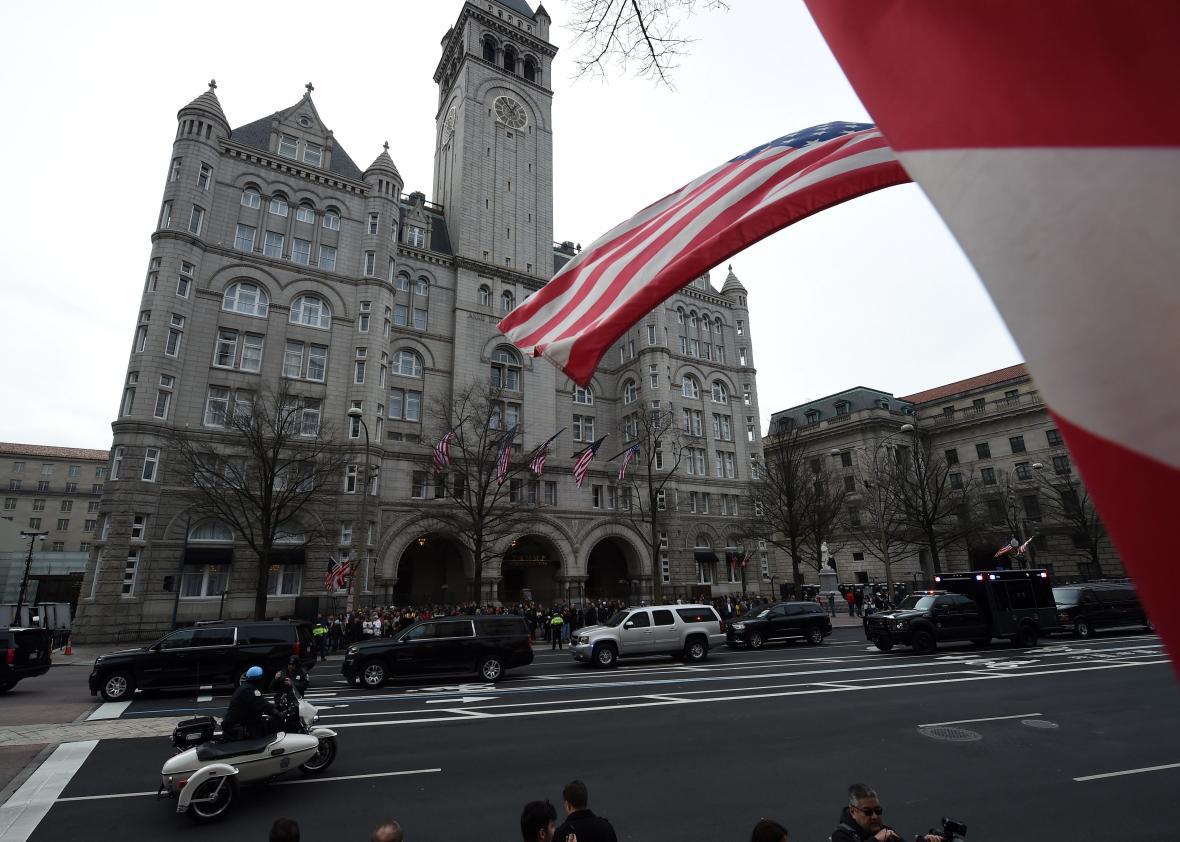And we’re off. A Washington ethics watchdog filed a federal lawsuit on Monday claiming that Donald Trump has already violated the U.S. Constitution by allowing his hotels and other businesses to accept payments from foreign governments. “We did not want to get to this point,” Noah Bookbinder, executive director of Citizens for Responsibility and Ethics in Washington, said in a statement. “It was our hope that President Trump would take the necessary steps to avoid violating the U.S. Constitution before he took office. He did not. His constitutional violations are immediate and serious, so we were forced to take legal action.”
The lawsuit is not a surprise: Good-government types have been loud and clear about fears that Trump would violate the so-called Emoluments Clause, which bars U.S. officials from accepting payments from foreign government, if he retained ownership of his sprawling business empire. The filing, however, marks the first concrete step taken to force Trump to actually address those concerns since he and his lawyers effectively shrugged them off at a press conference earlier this month. “No one would have thought when the Constitution was written that paying your hotel bill was an emolument,” Sheri Dillon, one of Trump’s lawyers, said at the time. She did not, however, offer any evidence to support that reading or address how it was possible for the larger plan she laid out at the press conference to “completely isolate” Trump from the Trump Organization given he retains an explicit financial and personal interest in its success.
The lawsuit does not seek monetary damages from the president but instead asks a federal court in New York to block Trump businesses from accepting money from foreign governments—and individuals or companies with ties to them—regardless of whether it comes in the form of payments for hotel stays, or golf course greens fees, or lease payments for commercial real estate in his office buildings, or loans for those same office buildings from banks. Trump has promised to take “all profits” from money paid to his hotels by foreign governments and donate it to the U.S. Treasury, though even if that plan fully addressed the emoluments concerns at the hotels—and it doesn’t—it still wouldn’t end concerns over other foreign payments.
CREW leans liberal, though on this particular issue it can claim bipartisanship. Richard Painter, who previously served as George W. Bush’s chief ethics lawyer and who joined CREW this December, is among those experts that have signed on to the suit. Other bold-faced legal names involved include: Norman Eisen, a former chief ethics lawyer in Obama’s White House; Harvard constitutional scholar Laurence Tribe; University of California–Irvine law school dean Erwin Chemerinsky; and Fordham University law professor Zephyr Teachout, who unsuccessfully ran for Congress this past year.
Still, Trump is not completely alone in his market-value reading of the Emolument Clause. In an academic paper published last week, University of Iowa law school professor Andy Grewal argued for a similarly narrow reading. He contends that a payment to a Trump-owned hotel would not be a violation because the cash would be going to a Trump corporate entity and not Trump personally. Grewal says that as a result there’s no problem with a foreign diplomat paying top dollar as long as he pays the same rate a regular tourist would. “He might subjectively hope that the president will view his patronage favorably, but subjective wishes cannot change the economic character of a transaction,” he wrote.
That’s a fight for another day, however. The most immediate hurdle facing the lawsuit isn’t the interpretation of the Emoluments Clause, which has been largely untested in court, but instead whether the group has the legal standing to challenge Trump in the first place. In order to sue someone, a plaintiff generally needs to prove that they were specifically harmed by the alleged wrongdoing in question. The group is attempting to check that box in a relatively creative way. It claims that since its mission is to investigate corruption, Trump’s actions represent a drain on resources that would otherwise be spent investigating its usual areas of interest, like campaign finance and the revolving door between K Street and the federal government. There’s some precedent to support such a claim, though it might be a stretch; the New York Times, for instance, notes that courts tend to be skeptical of such broad assertions of standing outside of the context of civil rights violations.
If the court does refuse to hear CREW’s case, though, it won’t be the end of the road. The American Civil Liberties Union says it is currently looking for hotels that compete against Trump properties for business and that would be willing to serve as plaintiffs in a similar case. While that would seem to be a better bet to make it to court, it relies on finding a business willing to risk angering a president who has made it clear he’s willing to single out corporations for public scolding and possibly even government retribution. The only other obvious option would be for Congress to take up the emoluments case itself. That, however, is unlikely as long as Trump is giving Republican leaders what they want.
Previously in Slate:
- Donald Trump’s Promise to Separate Himself From His Business Is Off to a Horrible Start
- Trump Promised to Do Five Things to Separate Himself From His Business. There’s a Glaring Problem With Each.
***Follow Josh Voorhees on Twitter, or email him at josh.voorhees@slate.com***
